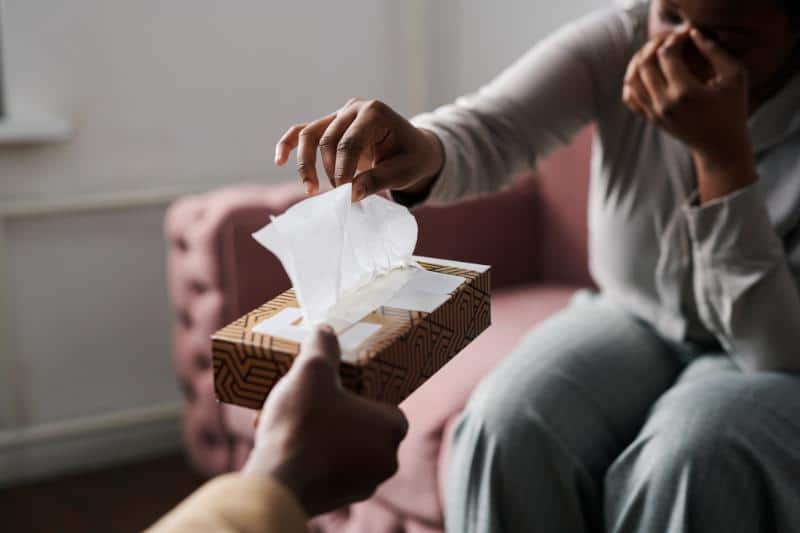Navigating the emotional maelstrom that follows a family tragedy might seem like an intimidating trek into the unknown. The pain, sorrow, and emptiness that follow the departure of a loved one often leave us grappling for a sense of normalcy. Coping with such profound grief is a deeply personal experience, and each individual must find their path to healing. In this blog post, we will delve into the diverse array of coping mechanisms that can help ease the burden of loss and guide individuals toward finding strength in the face of adversity.

Embracing Emotional Expression: The Power of Tears and Laughter
Grief is a multifaceted emotional journey, and allowing oneself to experience a range of emotions is a crucial aspect of the healing process. From the cathartic release of tears to the uplifting power of shared laughter, embracing emotional expression can serve as a therapeutic outlet. While society may sometimes impose a timeframe for grieving, it’s important to acknowledge that everyone copes differently and that healing is not a linear process.
Seeking Solace in Nature: A Healing Haven
Nature has an incredible ability to soothe the soul and provide solace during times of distress. Taking solace in the simplicity and beauty of the natural world can offer a welcome respite from the complexities of grief. Whether it’s a quiet stroll through a serene park or finding solace in the rhythmic sounds of crashing waves, connecting with nature can be a powerful coping mechanism that allows individuals to reflect, rejuvenate, and find a sense of peace.
Connecting with Supportive Communities: Strength in Unity
Grieving can be an isolating experience, but finding strength in unity can be a transformative coping mechanism. Sharing one’s journey with others who have experienced similar loss can foster a sense of understanding and empathy. Support groups, both online and offline, provide a space for individuals to connect, share their stories, and glean strength from the collective resilience of those who have walked a similar path.
Plan Ceremonies & Celebrations
While grieving a family loss, finding strength often involves exploring various coping mechanisms, and one impactful avenue is the thoughtful planning of ceremonies and celebrations to honor the departed. As Restland Funeral Home professionals suggest, you can create a fitting and memorable event to honor your loved one. These ceremonies provide a space for friends and family to come together, share cherished memories, and find solace in the collective support of those who also feel the impact of the loss. Whether it’s a solemn memorial service, a candlelight vigil, or a more celebratory gathering, the act of planning and participating in these events can be a powerful and cathartic way to navigate the complex emotions that accompany the mourning process. By incorporating meaningful rituals and tributes, individuals can discover strength in commemorating the life and legacy of their loved ones while fostering a sense of connection and healing within the community.
The Healing Power of Rituals: Creating Meaningful Traditions
Rituals play a significant role in providing structure and meaning during times of loss. Establishing meaningful traditions, whether it’s lighting a candle in remembrance, creating a memorial scrapbook, or dedicating a special day to celebrate the life of a loved one, can help individuals find comfort in routine. These rituals provide a tangible connection to the past, allowing for the preservation of memories and fostering a sense of continuity amid the upheaval of loss.
Artistic Expression: Channeling Grief into Creativity

For many, channeling grief into creative outlets such as art, music, or writing can be a powerful coping mechanism. Expressing emotions through various forms of artistic creation allows individuals to process their feelings in a non-verbal way. Whether it’s painting a canvas, composing a song, or penning a heartfelt letter, the act of creation becomes a therapeutic process that transforms pain into something beautiful.
Mind-Body Connection: Nurturing Physical Well-being
The mind and body are intricately connected, and taking care of one’s physical well-being is paramount during times of grief. Engaging in activities that promote physical health, such as regular exercise, proper nutrition, and sufficient sleep, can contribute to overall emotional resilience. A balanced lifestyle can provide a stable foundation for navigating the turbulent waters of grief and fostering a sense of strength and vitality.
Professional Guidance: The Role of Therapy in Healing
Professional guidance through therapy plays a pivotal role in the intricate process of healing after a family loss. Amid profound grief, individuals often find solace in the confidential and supportive space provided by trained therapists. These professionals offer a compassionate and empathetic ear, allowing individuals to express their deepest emotions without fear of judgment. Therapy serves as a constructive avenue for exploring the complex layers of grief, untangling the knots that may impede the healing process. Therapists provide valuable insights, coping strategies, and personalized tools to navigate the emotional turbulence that accompanies loss.
By embracing diverse coping mechanisms – from seeking solace in nature to connecting with supportive communities – those navigating the tumultuous seas of grief can gradually find a path toward healing. Each strategy discussed in this blog post serves as a testament to the resilience of the human spirit, highlighting that even in the face of profound loss, the capacity for strength and renewal exists within us all.
